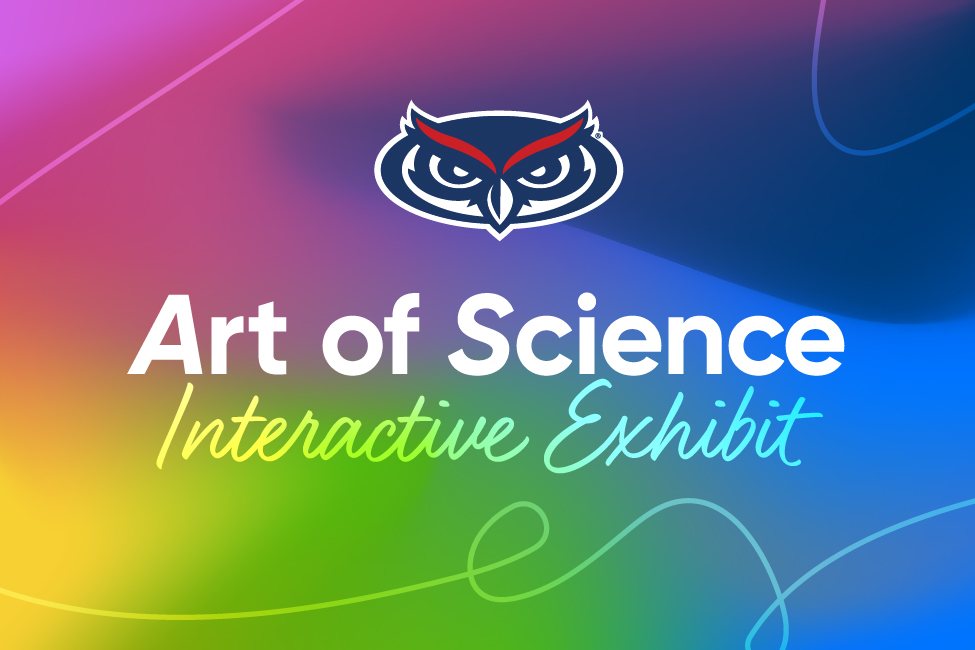Discovery, Creativity Converge at FAU's Art of Science Gallery

The Art of Science Interactive Exhibit celebrates the inherent beauty found in scholarly research and discovery.
Florida Atlantic University’s Division of Research will open the sixth annual Art of Science gallery with a reception on March 11 from 4 to 6 p.m. at the Ritter Art Gallery, 777 Glades Road, Boca Raton campus.
The Art of Science is a photo and video competition where Florida Atlantic’s faculty, staff, students and postdoctoral fellows are invited to submit images that capture moments where scholarly research and art converge.
“The Art of Science competition offers a fresh perspective on the concept of ‘research’,” said Cammi Clark, Ph.D., senior director of research communications at Florida Atlantic. “Academic inquiry is rooted in creativity. The images produced by high-tech microscopes or specialized field equipment can lead to major advancements in our understanding of the world, but they also hold an inherent beauty. This is what we celebrate through Art of Science.”
This year’s gallery exhibition will be the largest to date. In addition to featuring the remarkable images and videos of the 13 winners and 15 honorable mentions, objects and specimens associated with the art will be on display, offering the public a deeper understanding of the cutting-edge research underway at Florida Atlantic. Importantly, the gallery will celebrate Florida Atlantic achieving the R1: Very High Research Spending and Doctorate Production University designation from the Carnegie Classification of Institutions of Higher Education. This highly coveted status is the most prestigious research accolade in the country.
Art of Science contest entries come from across the university’s colleges and research institutes, as do the panel of judges who choose the winners. The public is also invited to choose its favorite entry through the People’s Choice category.
“The top three winners offer extreme close-ups of organisms that wouldn’t be top-of-mind for beauty – weeds, fish embryos and a mouse cerebellum,” Clark said. “The resulting images, however, are a kaleidoscope of shapes and colors that instantly spark curiosity and urge the viewer to lean in and say, ‘What is that?’”
The reception includes light refreshments, remarks from winners and special exhibits available only on opening night, such as a robotic dog built in the College of Engineering, and an autonomous holographic imaging system designed by researchers at Florida Atlantic for long-term studies in marine environments.
Attendance is free but registration is requested. To learn more about the Art of Science contest, the winners and to register, visit www.fau.edu/research.
-FAU-
Latest News Desk
- FAU Hosts Second Annual FairfaxWood Amyloid Related Diseases SummitFAU's Charles E. Schmidt College of Medicine recently hosted the summit, bringing together top scientists from North America and Europe to discuss the latest amyloid research and advancements.
- FAU Sensing Institute's Weather Network Brings Real-time ForecastingFAU I-SENSE is storm ready with SEA Econet, a cutting-edge weather network stretching from Key West to South Carolina, delivering real-time data to boost forecasting accuracy and strengthen coastal resilience.
- 'Eye' on Health: AI Detects Dizziness and Balance Disorders RemotelyFAU researchers and collaborators have developed a cost-effective, AI-powered system for diagnosing nystagmus - a condition causing involuntary eye movements - using smartphone videos and cloud-based analysis.
- Study Explores Barriers and Trends in Cannabis Use Disorder TreatmentA study over a 16-year period by FAU researchers shows a troubling decline in treatment for cannabis use disorder and reveals why most people with the disorder don't seek help.
- FAU Achieves R1 Status, Receive Carnegie Opportunity DesignationFlorida Atlantic University has been recognized for its leadership on two essential fronts: advancing science and discovery for the nation and prioritizing student access and success.
- Fixing the Leak: An Opioid Treatment for Dopamine Disorders?A breakthrough by FAU researchers shows that blocking the kappa opioid receptor improves behavioral deficits tied to ADHD, autism and bipolar disorder, providing a potentially safer yet effective treatment.






